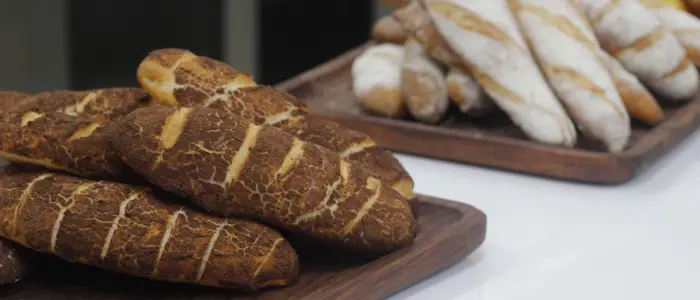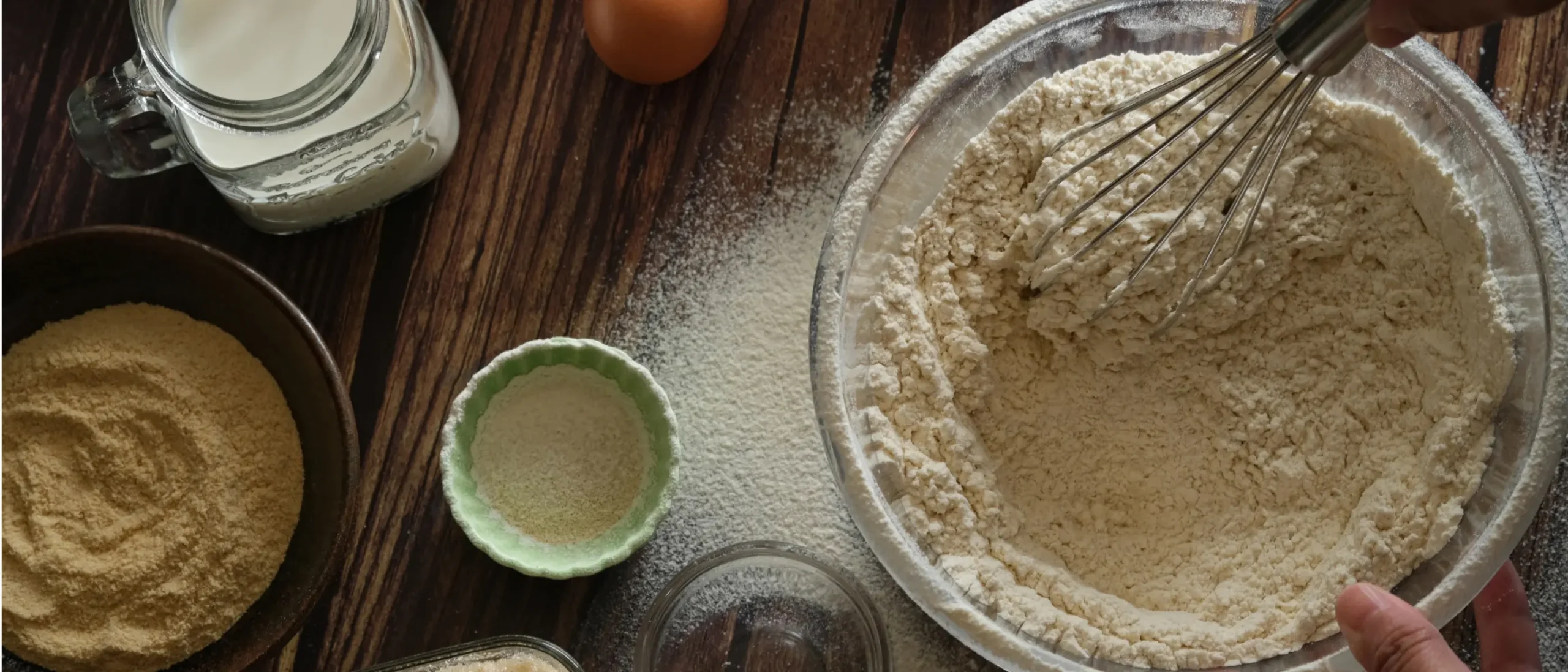Do you enjoy baking and hope to make a successful business? If you are well-known for your mouth-watering cupcakes, handcrafted bread, or exquisitely adorned cakes, launching a baking business may be a gratifying and fulfilling experience. However, when and where do you start?
Starting a successful baking business involves more than just a passion for baking; it also demands preparation, strategy, and business insight. It includes honing your recipes and promoting your brand. This comprehensive guide will cover everything you need to know, from deciding on your specialisation and organising your kitchen to setting prices and drawing clients.
Let’s make your love of baking a successful business, so put on your apron and start the oven!
Changing Demands and Opportunities in Baking Business
The baking industry and baking business in India are experiencing rapid growth. It had a market value of around Rs. 1,260 crores in 2023 and is expected to grow by Rs. 2,940 crores in 2032. Increasing customer demand for quick and healthy options, rising purchasing power, urbanisation, the popularity of artisanal and speciality goods, and bakeries’ capacity to accommodate online ordering and delivery are all contributing causes to the growth of the baking industry.
Therefore, starting a baking business in the rapidly growing marketplace could be one of your greatest opportunities. Initially, you should fix a niche for your business and decide on its main products such as,
- Gourmet and customised cakes
- Commercial breads and cakes
- Sponge cakes
- Artisan Breads
- Wedding Cakes
- Cookies and Biscuits
- Gluten-free options
- Unique dietary and healthy options
By discovering your niche and sticking to what works best for you, you can attract the target audience who would benefit from your business.
Types of Baking Businesses
One must understand the two bakery business models, retail and wholesale, before looking into the different kinds of bakeries. Depending on the needs of their community, proprietors occasionally combine the two. The types of bakery business models are,
- Retail bakery:
It is a B2C business that allows customers to connect directly with the customers and produce food products within their capability. There is no particular demand for the products on a daily basis.
- Wholesale Bakery:
It is a B2B form of business in which the point of contact is mostly the retailers. The goods are sold in bulk, and the orders are placed in huge numbers.
- Home Bakery:
It is primarily retail and sells products baked at home in small quantities. It primarily works on pre-orders and has a limited menu.
- Online Bakery/E-commerce Model:
It involves selling baked goods through a marketplace or website, such as subscription boxes and shipping products to the customer’s address.
- Custom Order Bakery:
It specialises in personalising and baking for events and other bulk orders such as birthday parties, weddings, baby showers and engagements.
- Mobile Bakery/Pushcart:
These are the types where the bakery keeps moving and sells in different locations. But if it is a Pushcart, it can stay at a particular location and sell its products.
- Cafe + Bakery Hybrid model:
It blends a cafe and a bakery. It promotes the sale of coffee and different types of pastries for snacks.
- Subscription Service Bakery:
It delivers baked goods to customers weekly or monthly. It mostly works online and might or might not own a bakery.
- Franchise Bakery:
It operates under an established brand and is owned by different owners. For example, franchises under Brownie Heaven, 7th Heaven and Bakingo
- Baking Classes & Workshops:
It provides certification and conducts baking and pastry-making classes. Suppose you’re looking for one of the best Baking Classes in Bangalore. In that case, consider taking up a Baking Masterclass mentored by top professionals in the industry.
What is the minimum Investment for a bakery business?
Starting a bakery in India usually costs between ₹50,000 and ₹5 lakhs for a modest setup and ₹10 to ₹25 lakhs or more for a bigger commercial bakery. It includes both small, home-based businesses and larger commercial bakeries. The associated costs are broken down as follows:

For a Home-Based, Small Bakery:
- Setup costs initially: ₹50,000 to ₹2 lakhs.
- Equipment: Standard equipment such as mixers, trays, tins, and baking ovens.
- Ingredients: Set aside money for basic supplies like sugar, flour, and other products.
- Delivery and Packaging: Packing costs and possible delivery charges.
- Manpower: 2 to 4 people with basic baking and bakery knowledge.
For a Bigger Commercial Bakery:
- Initial Investment: at least ₹20 to 50 lakhs.
- Equipment: Larger and more advanced machinery, such as display cases, mixers, and commercial ovens.
- Rent: Renting a decent location can be costly, particularly in big cities.
- Furniture and Interiors: Expenses associated with furnishing the interior of the bakery.
- Workforce: At least 6 to 10 workers. It can also depend upon the scale size of your bakery. For instance, the scale size differs between a medium-scale and a large-scale bakery.
Costs associated with acquiring the required licenses and permits for bigger commercial bakeries,
- Operating Expenses: Continuous costs for utilities, rent, salaries, and raw supplies.
Bank loan for bakery business
There are various schemes for bakery businesses to avail loans from; here are a few schemes broken down,
- Pradhan Mantri Formalisation of Micro Food Processing Enterprises (PMFME) offers a few subsidies and supports like
- Credit-linked capital subsidy
- Beneficiary contributions
- Support for micro food processing units
- Other support includes seed capital for SHGs, shared infrastructure, branding, and marketing support.
- Micro Units Development and Refinance Agency (MUDRA) loans are for small manufacturers, vendors, and businesses like restaurants and bakeries. The interest rates are set according to RBI regulations and range between 8.40% and 12.45% for 1 to 5 years.
- Other relevant schemes, such as the Annapurna Scheme, Khadi and Village Industries Commission (KVIC), the Ministry of Micro, Small and Medium Enterprises (MSME) schemes, and the Ministry of Food Processing Industries, can be used to acquire loans and subsidies from the government to start a bakery business.
How do I start a bakery business from home?
You must hone your baking abilities, draft a business strategy, secure the required permits, purchase equipment, set prices and packaging, and effectively market your company if you want to launch a home-based bakery. Here’s a more thorough explanation:
Improve Your Baking Ability and Establish Your Company:
- Improve your baking: Try various recipes, go to classes, look for a mentor to improve your abilities and develop a distinctive line of products, or take up a baking course that can help you.
- Identify your target market: Decide who you wish to serve, such as locals, event planners, or people with specific dietary requirements.
- Establish your product line: Choose your area of expertise, such as cakes, cookies, breads, or pastries.
- Establish corporate objectives: Establish your goals for the bakery business, including the revenue and expansion path you hope to achieve.
Draft a business strategy:
- Describe your company’s vision: Clearly state your long-term objectives, values, and mission.
- Perform market research: Examine your competitors and look for local opportunities.
- Create a marketing plan: Make a marketing plan for your business to reach your target audience using social media, local advertising, and word-of-mouth.
- Make a budget: Estimate your initial outlay, ongoing costs, and prospective earnings.
Requirements for Law and Regulation:
- Obtain the required licenses and permits. When running a home-based food business, abide by local laws.
- FSSAI registration: You might require FSSAI (Food Safety and Standards Authority of India) registration if you intend to sell online or through third-party platforms.
- GST registration: If your company’s revenue surpasses the threshold, you may choose to register for the Goods and Services Tax (GST).
Establish a Bakery at Home:
- Select an appropriate area: Make sure your kitchen is spotless, fully furnished, and used for baking.
- Purchase necessary equipment: Purchase baking pans, a decent oven, a mixer, and other equipment.
- Obtain premium ingredients: Build a rapport with trustworthy vendors for your baking requirements.
Is home baking profitable?
Yes, home baking can be a profitable commercial endeavour, particularly in India, where there are cheap overhead costs, an expanding market, and rising quality-conscious consumers.
Elements That Impact Profitability:
- Low Overhead: Home-based baking firms have much lower operating costs, including rent, utilities, and staff, than traditional bakeries.
- Expanding Market: The market for home bakers is growing due to the rising demand for fresh, superior baked goods.
- Growing Consumer Awareness: Home bakers can provide the distinctive and customised baked goods consumers seek.
- High-Profit Potential: Some baked goods, such as brownies, cupcakes, and personalised cakes, have high profit margins because they can be quickly produced in large quantities and customised.
Potential Earnings:
- Depending on location, baking speciality, and marketing abilities, a home baker may make between 10,000 and 50,000 per month.
- Experienced bakers with a strong client base and unique products frequently report better incomes.
- Cloud-based or home-based bakeries may make between ₹50,000 to ₹2,00,000 a month, with 20% to 30% profit margins.
Tips for Success in a Baking Business:
Although launching a baking business is a fantastic adventure, success demands more than just a love of making delicious desserts. Every stage is vital, from perfecting your recipes to cultivating loyal customers. The correct tactics will help you stand out in a crowded market, whether managing a shopfront or a home-based bakery. These crucial pointers will help your baking business succeed.

- Prioritise Quality: Use premium ingredients for baking and concentrate on producing scrumptious and eye-catching baked items.
- Provide Unique Products: Consider focusing on a specific kind of baked food or offering distinctive tastes and patterns.
- Create a Powerful Online Presence: Connect with potential clients and promote your items on social media and online channels.
- Deliver Outstanding Customer Service: Establish a devoted clientele by exceeding their expectations and delivering exceptional customer service.
- Effectively Promote Your Products: To reach a larger audience, use various marketing techniques, including social media advertising, word-of-mouth recommendations, and local partnerships.
Tools required for baking
When starting a bakery business, one should ensure that one is well-equipped with the necessary tools. The tools are broken down below,
| Baking Tools (Specific) | |
| Measuring Tools | Suitable for |
| Dry Measuring Cup | Home baking & Bakery business |
| Liquid Measuring Cup | Home baking & Bakery business |
| Measuring Spoon | Home baking & Bakery business |
| Baking Scale and Spoon Scale | Home baking & Bakery business |
| Oven Thermometer | Home baking & Bakery business |
| Mixing Tools | Home baking & Bakery business |
| Electric Mixers | Home baking & Bakery business |
| Mixing Spoons | Home baking & Bakery business |
| Mixing Bowls | Home baking & Bakery business |
| Whisks | Home baking & Bakery business |
| Spatula | Home baking & Bakery business |
| Preparatory Tools | Suitable for |
| Flour Sifter | Home baking & Bakery business |
| Pastry Brush | Home baking & Bakery business |
| Cake Tester | Home baking & Bakery business |
| Baking Paper | Home baking & Bakery business |
| Dough Sheeter | Home baking & Bakery business |
| Pastry Mat | Home baking & Bakery business |
| Egg Separator | Home baking & Bakery business |
| Cooling Rack | Home baking & Bakery business |
| Cutting Tools | |
| Grater | Home baking & Bakery business |
| Pastry Blender | Home baking & Bakery business |
| Cookie Cutters | Home baking & Bakery business |
| Dough Cutters | Home baking & Bakery business |
| Pastry Cutting Wheel | Home baking & Bakery business |
| Cake Knife | Home baking & Bakery business |
| Cake server | Home baking (Optional) & Bakery business |
| Chef’s Knives | Home baking & Bakery business |
| Cake Making and Decorating Tools | Suitable for |
| Cake Turntable Stand | Home baking & Bakery business |
| Cake Board | Home baking & Bakery business |
| Cake Spatula | Home baking & Bakery business |
| Rolling Pins | Home baking & Bakery business |
| Cake Pans | Home baking & Bakery business |
| Muffin Tins | Home baking & Bakery business |
| Cake Scraper | Home baking & Bakery business |
| Icing Spatulas | Home baking & Bakery business |
| Cake Leveler | Home baking & Bakery business |
| Cake Lifter | Home baking & Bakery business |
| Parchment Paper | Home baking & Bakery business |
| Silicone Piping Bag | Home baking & Bakery business |
| Piping Nozzle/Icing Nozzle | Home baking & Bakery business |
| Drip Bottle | Home baking & Bakery business |
| Bakery Machine Equipment | Suitable for |
| Refrigerators | Home baking (Optional) & Bakery business |
| Freezers | Home baking & Bakery business |
| Ovens | Home baking & Bakery business |
| Display Case | Home baking (Optional) & Bakery business |
| POS System | Home baking (Optional) & Bakery business |
| Bakery Safety Equipment | Suitable for |
| Gloves | Home baking & Bakery business |
| First aid kit | Home baking & Bakery business |
| Aprons | Home baking & Bakery business |
| Bar rags | Home baking & Bakery business |
| Food grade chemical supplies | Home baking & Bakery business |
| Chemical safety data sheet | Home baking (Optional) & Bakery business |
| Date labels | Home baking (Optional) & Bakery business |
Required Documentation for bakery business (Check List):
- FSSAI License
- GST Registration
- Trade License
- Fire License
- Trade Mark
- Business Pan Card
- Bank Account
- Proof of Premises
- Identity Proof
- Partnership Deed/Memorandum and Articles of Association (If you’re operating as a partnership or company)
- Food Safety Management System Certificate or Plan
Starting a baking business is wonderful, but you need the right skills to succeed. To assist ambitious bakers in pursuing their passion as a career, Whitecaps International School of Pastry provides programs taught by professionals. The six-month Excellence Diploma Program covers fundamental business skills like costing, entrepreneurship, and cleanliness while teaching beginners how to make cakes, pastries, artisanal breads, and sophisticated chocolate decorations.
The five-week Cake Engineering Program for cake specialists blends technical expertise with creativity as it delves into French, wedding, and themed cakes. For people who want to learn how to bake without eggs or gelatin without sacrificing flavour or texture, the Eggless Baking Program is ideal. Whitecaps gives you the tools to start a successful baking business with practical instruction and industry insights. Explore our Whitecaps International School of Pastry courses to begin your adventure immediately.
Frequently asked questions
How can I find my area of expertise in the baking industry?
Analyse trends, experiment with various products, and concentrate on what you are best at.
Do I need to take baking classes before I start?
Professional training can enhance your abilities and credibility. Whitecaps International School of Pastry has trained 500 students with over 105+ batches. We can help you start your career as a renowned pastry chef, a baking entrepreneur, or a confident home baking business from scratch by teaching you the basic and expertise level of baking and helping you market, advertise, and grow your brand both online and offline. Additionally, you will earn a course completion certificate. But if you’re already an expert in baking and can learn to manage things independently, then taking baking classes is not required.
Where can my baked goods be sold?
Sell online, in local markets, social media, or stores.
How should my baked items be priced?
Before deciding on the rates, determine the cost of ingredients, labour, expenses, and profit margin.
How can I advertise my baking company?
Use food delivery apps, Instagram, Facebook, local advertisements, and word-of-mouth.




